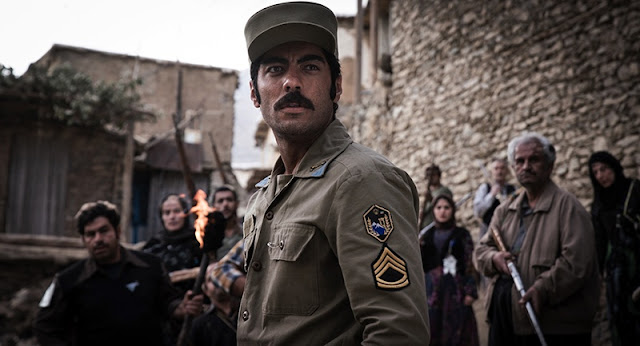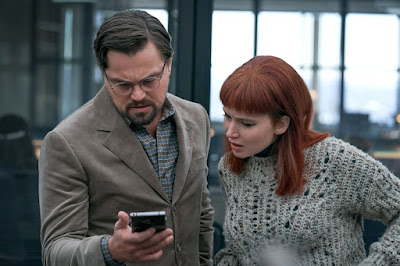ALL
OF US ARE DEAD
Directors - J.Q. Lee & Kim Nam-Soo
Screenwriter - Seong-il Cheon
series 1, 2022, South Korea
Another zombie splurge, I thought, which is just my thing so let’s see how
long I last. There have been a few series where I have bailed out after a few
episodes. I like to stick to things to the end – after all, ‘American Vandal’
only proved its depth given time, for example – but when you’re dealing
with a series, there’s only so much time you have.
But the first scene in ‘All of us are Dead’ – the
South Korean High School Zombie epic – had a long take that suddenly zipped
away from the intimacy of bullying on the school rooftop and circled round before
diving up close again. Then a Bible is brandished, which made me giggle at its
feint at a possession possibility before it’s used to pummelling-by-silhouette.*
Later, there was another long take where a teacher attacks and bites a student
and then the camera stays on the student as he turns into a zombie (blood
spurts from his cheek) and then he gets up to attack his peers. And then the camera
pulls out of window, seemingly through the glass. Long takes and trick shots,
as if Iñárritu was slumming it by directing a zombie show. But these moments
are what I am a sucker for, and I realised that, no matter how standard the
drama, I am going to be compelled to watch more to see what they do each
episode.
And then episode two is off and running with a startlingly
choreographed zombie assault on the canteen. A mixture of hand-held and drone
camera. It is breathless stuff and feels a full meal and cinematic rather than
TV. Of course, that’s not such a surprise in this Golden Era of Television
where the lines are blurred – the ‘Daredevil’ series had a few long-take
fight scenes, for example – but it doesn’t feel hampered by television
dramatics like, say, ‘The Walking Dead’ and its imitators. That’s
because the action is brilliantly choreographed and feels as orchestrated as
those of, say, ‘The Raid’; let’s say it’s no accident that ‘Train to Busan’
is namechecked. Perhaps a suitable comparison is the organised crime series ‘Gangs
of London’, with its thrillingly composed fight scenes.
With episode three of ‘All of us are Dead’, it’s
time for things to slow down for some character development and conflict. This also means that things suffer from the
Stupidity Of Characters, which may leave you scowling (Really: it’s time for the
love triangle right now? & Snap out of it! & Just put him in the other
room! etc) Mostly, this involves Queen Bitch against the group and loss of
friends, the former designed to get the blood boiling and the latter fair
enough in a zombie scenario.

One of the dominant themes throughout is that of
bullying. Certainly, films like ‘Last Child’, ‘Pluto’ and ‘King of
Pigs’ present Korean schools as hellholes of bullying and abuse. Here, the feelings
of persecution and fear a teen may feel about his/her peers are fully justified
by the zombie epidemic. A disgraced scientist father reacts badly to his son’s
bullying and when his lab mouse bites a student and unleashes the epidemic, his
nihilism and disgust at humanities’ cruelty comes full force. And then, of
course, there is the school trying to cover up that bullying and the abduction of
a student by a teacher to save face. There’s also teen pregnancy and a group of
politicians to take us outside while our main group of teens are trapped in one
classroom.
Episode 4 continues this but also spends time with a
subject which is often neglected and often challenges my suspension of belief
with films and TV: they discuss the problem of toilets and how it will work for
the group. This even deserves its own montage and wins points for addressing
this often unaddressed reality (I am often left thinking “But what about going
to the toilet?” in a film as much as “Yeah, they wouldn’t get up from that.”). Then
the action picks up elsewhere with a run for the rooftop with the politician’s group
whilst the chief concern admirably leaves our teens in one room working out
what to do. There’s also a policeman running about the city and some arrow-shooting
teens also scrambling about the campus.
And with episode 5, we’re back to less questionable
character behaviour. There’s an excellent library confrontation, but the showy
long takes have been abandoned. The pace is impressively swift again, with all
the subplots getting their moments. Now it’s got rid of the Queen Bitch student,
there’s no recourse to cheap confrontation to keep things going, which is refreshing.
This main group of teens is just trying to work things out and they are a solid
bunch of characters. I appreciate the emphasis being upon their bonding in a time
of need rather than incessant bickering.
Episode 6 starts with a montage of all the subplots
and promises a swift pace. But it’s mostly a filler, shoving along these
subplots with further nuance. The zombies are evolving (“hambies”), our teens
risk their lives from one room to another, our policemen almost but don’t get
far. It ends with the teens making video blubs with the school camera, but that
seems appropriate.

So by this stage in the series, it is obvious that the
bravura flourishes of the first two episodes have given way to more standard aesthetic.
It is twelve episodes long, and a lull in the midsection is perhaps expected. This
is why ‘Squid Game’ being nine episodes long was an indication that it
was wisely as long as it wanted and needed to be, with little padding. Even so,
‘All of Us are Dead’ had won enough good will with me initially and
established enough subplots to keep things lively. The hallway fights and fleeing from one place to another are all thrilling, with the battle in the gym a late-stage highlight. Every time the teen troubles
threaten to drag, one of the subplots kicks in to keep interest and throw in
some action. At least until the end. And I like the more realistic dilemma of
being trapped in one place for a while; that on more than one occasion characters
make a dash for it but have to run back. So they don’t discuss toilet arrangements
on the rooftop, but the show has at least nodded to those real problems.
What is also impressive is the sense of widespread
desolation within a limited scope, especially in the penultimate episode. The undead
bullies keep coming; the army wavers between uselessness and overreaction; a
father braves the situation solo to save his daughter. You’ll probably be
inclined to shout at the characters to do something/don’t do that/why’re you
just standing there emoting?? as dramatics occasionally overtake the narrative.
So it doesn’t match the promise of its opening, but ‘All
of Us are Dead’ remains entertaining throughout, and you might even find
yourself caring about some of the kids. And the series doesn't skimp on casualties, and even musters up investment in many. Certainly, a cut above average even if
doesn’t achieve distinction.































